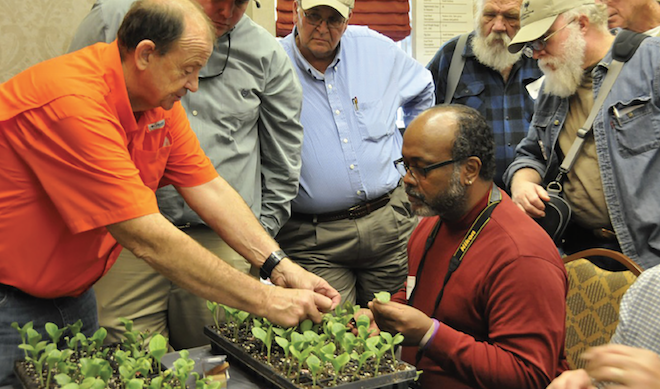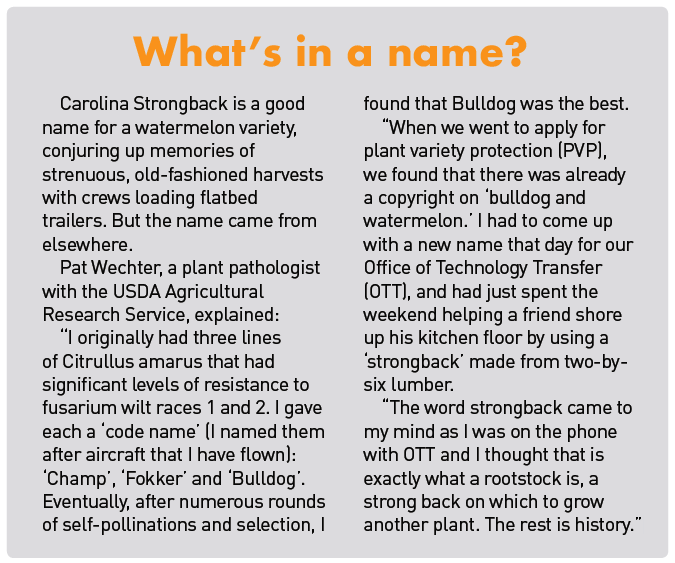

Dec 27, 2019Carolina Strongback beats nematodes, fusarium
Carolina Strongback’s the name. Protecting melons is the game.
A watermelon tough enough to handle the fusarium wilt and soil nematodes has been bred by scientists from the USDA’s Agricultural Research Service (ARS) and Clemson University. Seeds from a yet-to-be-named company could be available in 2020.
Though the new watermelon tastes like a cucumber, its growing traits have substantial value for breeding programs and for growers who can graft onto it vines that bear tastier fruit.
“While grafting of watermelons using the Carolina Strongback rootstock is ideal for organic production, grafting of watermelon is a new ‘old-school’ tool for conventional growers in the United States,” said Pat Wechter, a plant pathologist with the USDA’s ARS U.S. Vegetable Research Laboratory in Charleston, South Carolina.
Resistant rootstock
Vegetable grafting is an ancient technique that’s today practiced by many organic growers to give vegetables a boost. But Wechter said that even many conventional growers may consider grafting into Carolina Strongback for very practical reasons.
Southern growers for decades used methyl bromide fumigation to deal with pathogens and microscopic soil bugs. Now that methyl bromide has been phased out, growers have been left in a bit of a lurch.
“We feel that the use of host-plant resistance by way of a resistant rootstock will function as a management strategy for several of these pathogens while reducing the costs, both real and environmental, associated with fumigant application,” Wechter said. “What makes Carolina Strongback unique is that the rootstock has high levels of resistance to several of the watermelon industry’s most significant soil-borne pathogens.”
Those pathogens include what growers know as fusarium wilt and rootknot and reniform nematodes.
A microscopic worm, the rootknot nematode “causes severe galling and deformation of watermelon roots, reducing uptake of water and nutrients to the developing fruit, and resulting in a reduction of harvests and even crop loss when not controlled,” according to Wechter.
Squash and bottle gourd vines have been used as rootstocks for watermelon, but with Carolina Strongback being an actual watermelon, he said there’s less risk of the resulting fruit having flavor issues.
Finding family
Developing Carolina Strongback as a melon line involved roughly a decade of establishing plant lines and breeding for the desired traits.
Technically, Strongback is a Citrullus amarus, a “Citron melon,” wild cousin of the cultivated watermelon (Citrullus lanatus).
“Also called the cow melon as it was used as a nutrient and water source for grazing cattle in these countries,” Wechter said. “About 140 lines have been collected in the wild over the past 100 years or so and are housed at the Plant Genetic Resource Conservation Unit in Griffin, Georgia.”
Breeding work took place at the U.S. Vegetable Laboratory (USVL), a USDA-ARS research facility and the CREC Clemson Research station in Charleston, South Carolina.
Wechter worked with USVL geneticist Amnon Levi to cross wild melon varieties and select offspring.
“The most difficult part of the breeding process was the determination of resistance levels to the different races of fusarium,” he said. The genetics were complicated – numerous genes had resistance, but to different “races” or types of fusarium.
“We had to go from seed-to-seed for over seven generations, with selection for resistance to both races of fusarium at each generation,” Wechter said. “While not overly difficult, it was quite time-consuming.”
Art and science


Carolina Strongback on grower fields. It was tested in the United States, Mexico and
Australia in 2019 in infected fields where current watermelons were not able to be
produced. Results were extremely positive, said Pat Wechter of the USDA’s Agricultural
Research Service. Photo: USDA
If grafting were easy, all growers would slice and splice.
Grafting, is, however “an art as well as a science,” said Clemson University horticulture scientist Richard Hassell, who tested Carolina Strongback for grafting.
A shortage of skilled labor, too, remains a struggle.
“Cucurbit grafting is the most difficult crop to graft and of the cucurbits, watermelon is the worst,” he said. “With cucurbit grafting, at least one of the two cotyledon leaves (the first leaves to emerge) need to remain intact. This is where the skilled labor comes in. To leave this cotyledon leaf and remove all the meristematic (stem growth) tissue is extremely difficult.”
Automation is increasingly rolled out as an answer to labor shortages, and plant grafting is no exception. Clemson University has developed a new grafting technique and set up a Korean-made robotic system set up to automatically graft plants for later transplant.
“Over the years, we developed a method to eliminate the need for the cotyledon leaf and thus grafting can take place below the growing point,” Hassell said. “By doing this, you have eliminated the chance of the rootstock wanting to re-grow and abort the scion material (watermelon, melon or cucumber). The robot, through a few modifications, can perform the grafting task and thus eliminating the need for skilled workers.”
— Stephen Kloosterman, associate editor; Top photo: Richard Hassell demonstrates a patented grafting technique developed at Clemson Coastal Research and Education Center. By Clemson University/Peter Kent















